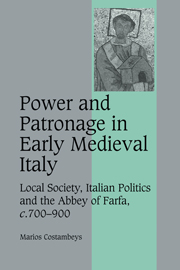 Power and Patronage in Early Medieval Italy
Power and Patronage in Early Medieval Italy Book contents
- Frontmatter
- Contents
- List of illustrations
- Acknowledgements
- Note on charter editions
- List of abbreviations
- Maps
- 1 INTRODUCTION
- 2 PATRONAGE AND LOMBARD RULERS
- 3 AUTHORITY, RULERSHIP AND THE ABBEY
- 4 THE MONKS AND ABBOTS OF FARFA: IDENTITIES AND AFFILIATIONS
- 5 SABINE LANDS AND LANDOWNERS
- 6 ELITE FAMILIES IN THE SABINA
- 7 FARFA AND ITALIAN POLITICS IN THE LOMBARD ERA
- 8 FARFA, ITALIAN POLITICS AND THE CAROLINGIANS
- Bibliography
- Index
- Cambridge Studies in Medieval Life and ThoughtFourth Series
8 - FARFA, ITALIAN POLITICS AND THE CAROLINGIANS
Published online by Cambridge University Press: 17 July 2009
- Frontmatter
- Contents
- List of illustrations
- Acknowledgements
- Note on charter editions
- List of abbreviations
- Maps
- 1 INTRODUCTION
- 2 PATRONAGE AND LOMBARD RULERS
- 3 AUTHORITY, RULERSHIP AND THE ABBEY
- 4 THE MONKS AND ABBOTS OF FARFA: IDENTITIES AND AFFILIATIONS
- 5 SABINE LANDS AND LANDOWNERS
- 6 ELITE FAMILIES IN THE SABINA
- 7 FARFA AND ITALIAN POLITICS IN THE LOMBARD ERA
- 8 FARFA, ITALIAN POLITICS AND THE CAROLINGIANS
- Bibliography
- Index
- Cambridge Studies in Medieval Life and ThoughtFourth Series
Summary
FARFA, THE FALL OF THE LOMBARD KINGDOM AND THE ADVENT OF THE CAROLINGIANS
At the centre of the political history of the period covered by this book is the Frankish conquest of the kingdom of the Lombards between late summer 773 and spring 774. This dramatic event was a crucial moment in the history of medieval Italy (and arguably, of western Europe), and the major roles in it have, not unnaturally, been accorded to those chief protagonists on whom our narrative sources concentrate: the Frankish and Lombard kings, and the popes. Farfa, along with figures associated with it like the dukes of Spoleto, have generally appeared as peripheral players, albeit that they have often been accorded some importance. It is certainly not my intention here to deny significance to Charlemagne, Desiderius, Pope Hadrian I, their predecessors, successors and associates. But I will argue that Farfa, and those in its region who were associated with it, have not been given quite the prominence in the story that they deserve. To some extent this arises from an understandable reliance by historians primarily on contemporary narrative texts, and on those texts' tendency to tell the story as a partisan engagement between a few key personalities. I am thinking here especially of the Liber Pontificalis, and of the various Frankish annals. The former is still unfortunately under-problematized, while the latter are now increasingly revealed as vehicles for the propagation of Carolingian ideology as it stood at the time when they were written.
- Type
- Chapter
- Information
- Power and Patronage in Early Medieval ItalyLocal Society, Italian Politics and the Abbey of Farfa, c.700–900, pp. 273 - 352Publisher: Cambridge University PressPrint publication year: 2007


